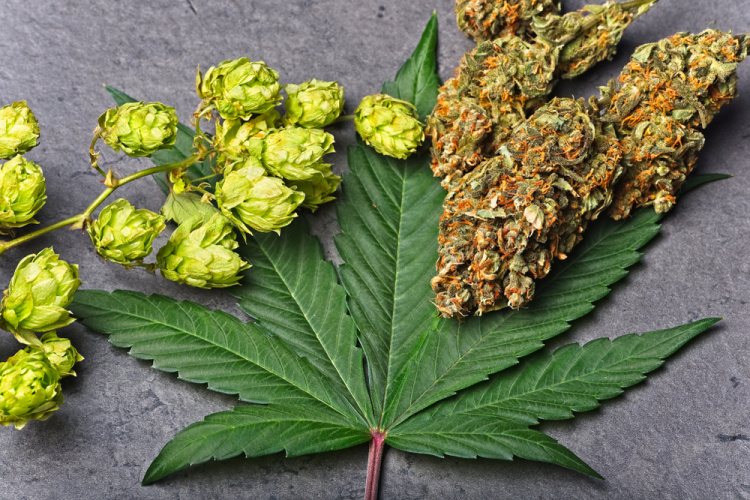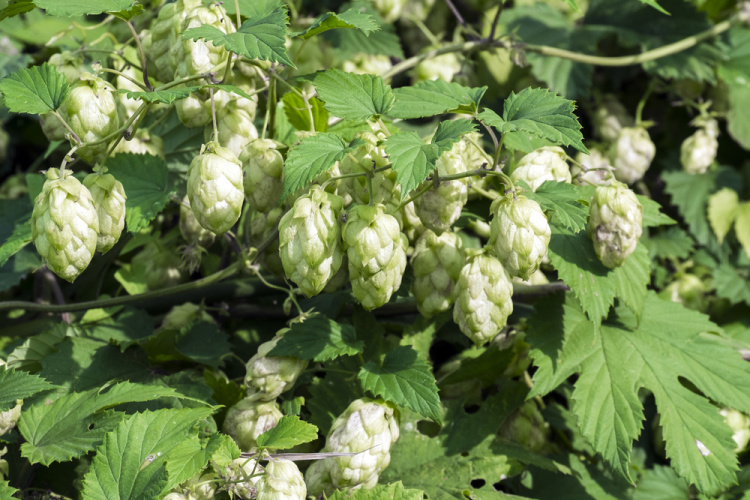You’re probably familiar with the concept of cannabinoids—the compounds such as THC and CBD that some like to call the “active ingredients” in cannabis—but they’re not the end of the story. Cannabis, in addition to many other plants, contains hundreds of terpenes, or fragrant essential oils. They’re what give different strains of cannabis their distinctive flavors and aromas, but they’re doing much more behind the scenes. Researchers now believe that terpenes may play a critical role in the effectiveness of medical cannabis, bringing powerful anti-inflammatory, antibacterial, and even anti-cancer properties to bear.
Today we’ll focus on one of the most important: Humulene. An aromatic compound found in many types of wood and the hops that flavor beer, humulene not only contributes an earthy, woodsy scent but may also play a role in helping our bodies absorb medicines and even fight tumors.
Humulene: What Does It Do For Our Bodies?

If you’ve detected a subtly woody aroma in beer, freshly cut wood, or certain strains of cannabis, you may be smelling the terpene humulene. Found in sage, cinnamon, juniper, and many other plants and woods, it’s one of the most important of the over 200 terpenes found in cannabis.
Beyond its pleasing scent, humulene imparts some intriguing and potentially useful medicinal properties. For centuries, folk medicine practitioners have used humulene-containing substances such as balsam fir oil to soothe tired muscles and help support healthy respiratory function.
Modern research supports those ancient doctors’ practices. Like many terpenes, humulene has been shown to demonstrate powerful antimicrobial effects, in one study, it even appeared effective against the Staphylococcus aureus bacterium. And several studies demonstrate humulene’s anti-inflammatory powers. One study found that it was as effective as the powerful steroid dexamethasone. But there are other, even more unusual ones for this surprising terpene.
For one thing, although cannabis is generally regarded as an appetite stimulant—yes, the munchies are real—humulene tends to have the opposite effect. The terpene’s appetite-suppressing qualities might someday lead to safer, more effective and sustainable weight-loss treatments.
Even more impactfully, some researchers believe humulene may have a role to play in alleviating certain cancer symptoms, one of the world’s great remaining medical challenges. Here’s what we know so far.
Humulene: How Can This Cannabis Ingredient Help Cancer Patients?

Humulene has several properties that cancer patients may find beneficial. Research shows that humulene may impart boosts in energy and focus. As a result, it can help cancer patients recover faster after treatments like chemotherapy.
In addition, humulene’s proven antimicrobial and antifungal effects may be able to help cancer patients. Cancer (and cancer treatments) can take a serious toll on a patient’s immune system. These antimicrobial effects can improve their natural defenses against subsequent infections.
Humulene may help cancer patients with what’s known as palliative care. This field of medicine is fairly new—in fact, it’s only begun to develop over the last few decades. However, it’s begun to gain momentum as researchers seek ways to help cancer patients.
Palliative care’s main focus is to ease terminal patients’ suffering. Although the FDA hasn’t approved medical cannabis for palliative care, other countries’ health systems (notably Canada’s) have. Terminal cancer patients who live in states with medical marijuana may be able to use medical cannabis containing terpenes like humulene to find relief.
Interested in experimenting with humulene’s possible benefits for yourself? Find a store near you for a vast selection of strains and infused products, some of which contain humulene.
Qualifying conditions vary by state. Any information related to qualifying conditions in this post may not apply to cannabis patients in all states. Product availability also varies based on state program restrictions and rules, so the products discussed may not be available in all states. Check with your local Green Goods location about the products available in your state.
